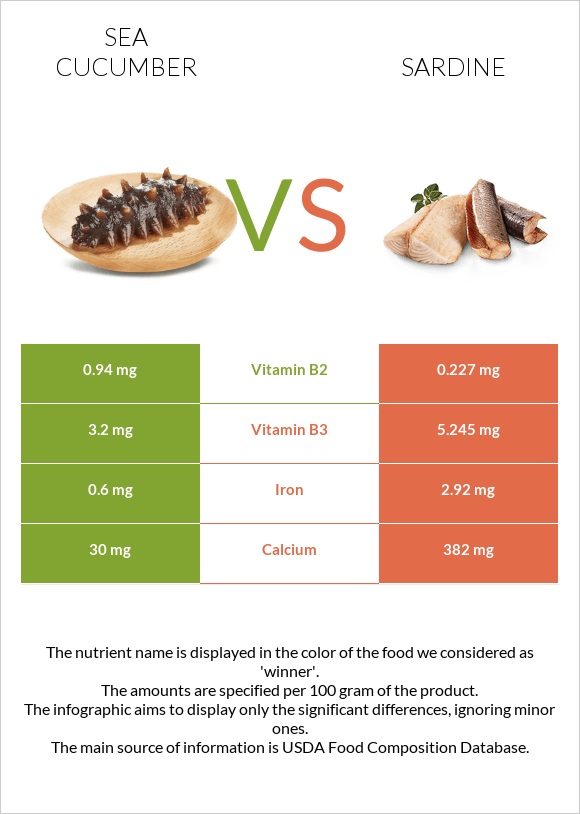Sea cucumber vs. Sardines — In-Depth Nutrition Comparison
Compare
How are sea cucumber and sardines different?
- Sea cucumber is richer in vitamin B2, while sardines are higher in calcium, iron, and vitamin B3.
- Sea cucumber covers your daily need for vitamin B2, 55% more than sardines.
Sea cucumber, yane (Alaska Native) and Fish, sardine, Atlantic, canned in oil, drained solids with bone types were used in this article.
Infographic

Infographic link
Mineral Comparison
Mineral comparison score is based on the number of minerals by which one or the other food is richer. The "coverage" charts below show how much of the daily needs can be covered by 300 grams of the food.
| Contains less SodiumSodium | -100% |
| Contains more CalciumCalcium | +1173.3% |
| Contains more IronIron | +386.7% |
Vitamin Comparison
Vitamin comparison score is based on the number of vitamins by which one or the other food is richer. The "coverage" charts below show how much of the daily needs can be covered by 300 grams of the food.
| Contains more Vitamin B2Vitamin B2 | +314.1% |
| Contains more Vitamin B1Vitamin B1 | +60% |
| Contains more Vitamin B3Vitamin B3 | +63.9% |
All nutrients comparison - raw data values
| Nutrient |  |
 |
DV% diff. |
| Vitamin B12 | 8.94µg | 373% | |
| Selenium | 52.7µg | 96% | |
| Phosphorus | 490mg | 70% | |
| Vitamin B2 | 0.94mg | 0.227mg | 55% |
| Cholesterol | 142mg | 47% | |
| Calcium | 30mg | 382mg | 35% |
| Polyunsaturated fat | 5.148g | 34% | |
| Iron | 0.6mg | 2.92mg | 29% |
| Vitamin D | 193 IU | 24% | |
| Vitamin D | 4.8µg | 24% | |
| Protein | 13g | 24.62g | 23% |
| Copper | 0.186mg | 21% | |
| Fats | 0.4g | 11.45g | 17% |
| Vitamin E | 2.04mg | 14% | |
| Choline | 75mg | 14% | |
| Sodium | 307mg | 13% | |
| Vitamin B3 | 3.2mg | 5.245mg | 13% |
| Vitamin B5 | 0.642mg | 13% | |
| Vitamin B6 | 0.167mg | 13% | |
| Potassium | 397mg | 12% | |
| Zinc | 1.31mg | 12% | |
| Monounsaturated fat | 3.869g | 10% | |
| Magnesium | 39mg | 9% | |
| Calories | 56kcal | 208kcal | 8% |
| Saturated fat | 1.528g | 7% | |
| Manganese | 0.108mg | 5% | |
| Vitamin A | 32µg | 4% | |
| Vitamin B1 | 0.05mg | 0.08mg | 3% |
| Folate | 10µg | 3% | |
| Vitamin K | 2.6µg | 2% | |
| Tryptophan | 0.276mg | 0% | |
| Threonine | 1.079mg | 0% | |
| Isoleucine | 1.134mg | 0% | |
| Leucine | 2.001mg | 0% | |
| Lysine | 2.26mg | 0% | |
| Methionine | 0.729mg | 0% | |
| Phenylalanine | 0.961mg | 0% | |
| Valine | 1.268mg | 0% | |
| Histidine | 0.725mg | 0% | |
| Omega-3 - EPA | 0.473g | N/A | |
| Omega-3 - DHA | 0.509g | N/A |
Macronutrient Comparison
Macronutrient breakdown side-by-side comparison
Protein:
13 g
Fats:
0.4 g
Carbs:
0 g
Water:
80.7 g
Other:
5.9 g
Protein:
24.62 g
Fats:
11.45 g
Carbs:
0 g
Water:
59.61 g
Other:
4.32 g
| Contains more WaterWater | +35.4% |
| Contains more OtherOther | +36.6% |
| Contains more ProteinProtein | +89.4% |
| Contains more FatsFats | +2762.5% |
~equal in
Carbs
~0g





